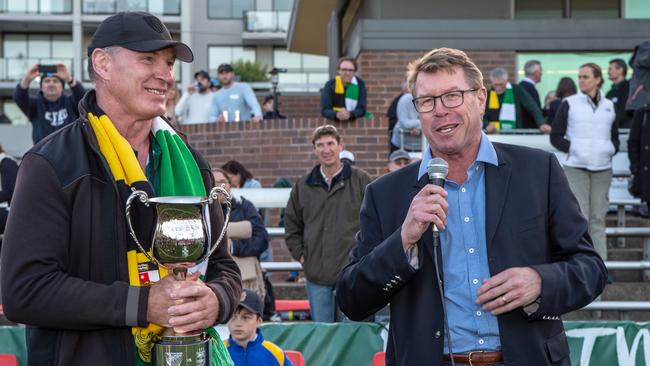Playing the blame game is just not rugby
Mark Ella on why he refused to sign the captains’ letter that caused such a seismic shift in Australian rugby.

Yes, that letter, the one signed by Farr-Jones, George Gregan, George Smith, Phil Kearns, Rod McCall, Stephen Moore, Nathan Sharpe, Simon Poidevin, Stirling Mortlock, Jason Little and Michael Lynagh, although “Noddy” subsequently removed himself.
I could understand the frustration of those ex-captains about the state of the game in Australia but I did not believe it was appropriate to send a letter to RA chairman Paul McLean demanding changes at the top.
McLean is also a former Wallabies captain and I wonder if Farr-Jones asked him to sign the letter!
While the content of the letter was pretty general, it was obvious the main target was the now former RA chief executive Raelene Castle.
The letter was published in The Australian on Tuesday and by Thursday afternoon Castle had tendered her resignation. That’s why I did not want to sign it.
Whatever you think of Castle’s performance over the last three years — and I certainly have not agreed with everything she has done — it would be wrong to blame one person for rugby’s ills, although if media reports are correct, some RA board members may soon follow her out the door.
The reality is the game in Australia has been in decline for about the last 10 years at least, if not longer.
The Wallabies have not won anything for ages and our Super Rugby teams, with the possible exception of the Brumbies, can barely put up a fight against New Zealand and South African opposition.
Off the field, the state of the union is just as bad with television ratings and crowd figures down and sponsors deserting the game.
But who is really to blame?
When things go bad, Australian rugby’s response has always been the same.
Get rid of the chief executive. Who in their right mind would put up their hand for this job?
Just look at the way RA’s chief executives have been treated over the years.
John O’Neill, the first and arguably the best of them, has come and gone twice.
When RA got rid of O’Neill in 2004 they decided they needed someone completely different and appointed the more agreeable Gary Flowers.
Then they decided they needed someone with a more combative personality, O’Neill was brought back.
O’Neill did not enjoy as much success the second time around but he was in the process of introducing some important reforms when he departed again in 2012.
Now there are calls for O’Neill to lead a “war cabinet” to save the game.
He must just shake his head.
RA did a worldwide search for a new chief executive and found Bill Pulver living next door to former Wallabies captain and RA board member John Eales in the affluent Sydney harbourside suburb of Mosman.
Pulver started in the job with great expectations but he too departed in acrimonious circumstances, copping the brunt for the axing of the Western Force.
Like her predecessors, Castle has discovered it is not difficult to run out of support players in Australian rugby and become isolated, particularly when you are trying to bring about change. But rugby is meant to be a team game, perhaps the ultimate team game because it caters to all shapes and sizes and various skill sets.
That’s what Australian rugby needs right now, a team approach.
Sure, the chief executive of RA must provide leadership but everyone in the game has to take their share of responsibility for when things are going well and for when they are not.
That includes the RA board, Wallabies coaching staff, the Super Rugby franchises, the premier clubs and perhaps most importantly of all, the players.
If you look closely at who did and who didn’t sign the letter, you will see a reasonably clear delineation between the amateur and professional eras.
Of the 10 remaining signatures on the letter, only two — Farr-Jones and Poidevin — played exclusively in the amateur era, while many of those who refused to sign it such as myself, Mark Loane, Andrew Slack and Tony Shaw played for love, not money.
Don’t get me wrong, I’m all for players being paid to play the game they love but we should not forget the values and ethos of the amateur era, particularly camaraderie, as we chase the almighty dollar.
If we are going to continually blame one person for all of our problems, that’s not rugby.



I was one of the former Wallabies captains who my old halves partner Nick Farr-Jones approached to sign a letter calling for leadership change at Rugby Australia and I declined to put my name to it.